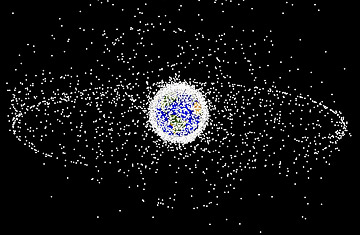
A computer-generated image of objects in Earth's orbit
(2 of 2)
So why is space travel survivable at all? Because all speed is relative. A satellite orbiting Earth may be moving at 17,500 m.p.h., but so is every other object in the same orbital corridor. Relative to one another, they're standing still. If one happened to speed up to 17,505 m.p.h., the most it could do is nudge another ship at 5 m.p.h. Attaining orbit is like entering an expressway: the tricky part is merging; once you're there, all you have to do is maintain your speed, and you'll be fine. (Read "Are We Bringing Our Germs to Mars?")
The trouble comes when speed — or worse, the angle — of orbit changes. Things in higher orbits move more slowly than things in lower ones. A dead satellite or one that has lost gyroscopic control could go tumbling down to lower and lower orbits, colliding with objects moving at different speeds along the way. Similarly, the International Space Station and its three astronauts do, in theory, lie in the path of the debris created by Tuesday's collision, and while international space officials believe the danger to the crew is low, they do not rule it out.
"At this time and in the near future, there's no threat," was all Alexander Vorobyev, the head of Russia's civilian space agency, was willing to concede.
True killer collisions occur not when spacecraft traveling in the same band or orbital plane bump each other but when there's a full-blown crash between two ships in different planes — say, between one ship in an orbit that carries it over the U.S. and Central Asia, and another in an orbit that carries it over Western Europe and Eastern Asia. That's what happened on Tuesday.
"Think about two cars colliding in an intersection," says Nicholas Johnson, head of NASA's Orbital Debris Program. "The individual speeds [of the satellites] were about 17,000 m.p.h., but the collision speed was 26,000." (See pictures of meteors that hit Earth.)
It's hard to bear thinking about what would have happened if there had been astronauts aboard either ship — but space officials can't afford not to think about it. There is currently no international treaty governing space debris, though the U.S., Russia, Japan, France and the European Space Agency have rules they follow to keep the junk to a minimum. Additionally, an international committee overseen by most of the world's space agencies consults on the issue. Still, it's a problem that isn't going away.
"It was only a matter of time before something like this happened," says Matney. Worse, it is almost certainly just a matter of time before it happens again.
